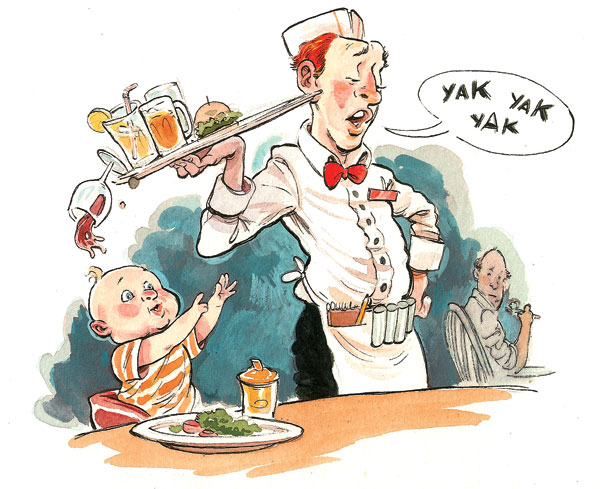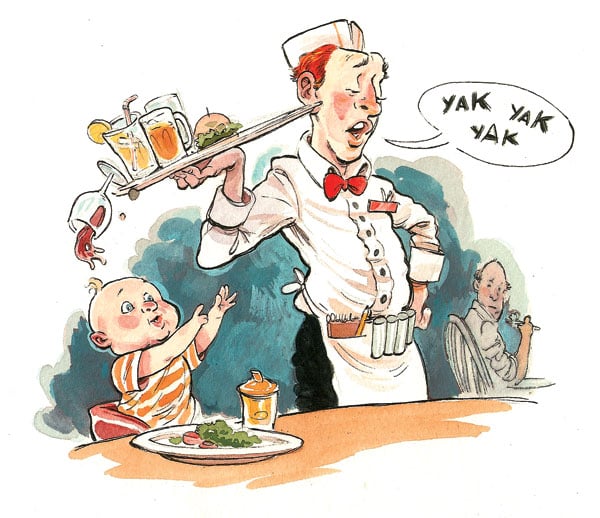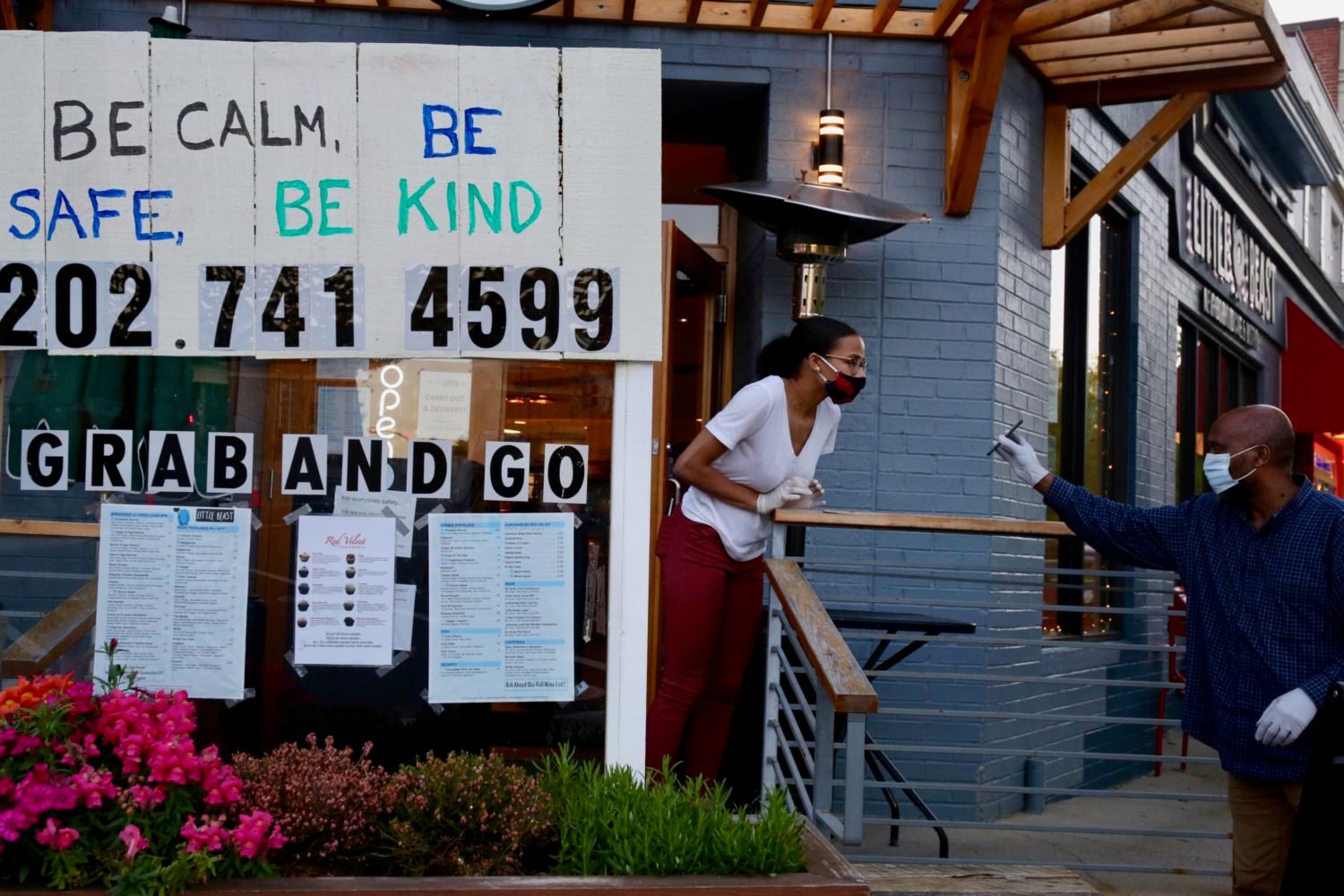
Illustration by Britt Spencer.
The texts my wife liked to send me while I was out at dinner were meant to impart a sense of closeness but only reinforced this feeling of being alone on the road. Restaurant-going had been a huge part of our dating life. Our first dinner date had been at Red Sea, the now-defunct Ethiopian place on 18th Street in DC’s Adams Morgan. Nothing fancy. I’d wanted to see whether she was my kind of woman–a real eater, up for an adventure–or a princess in need of pampering.
“How’s dinner?” she would text me.
If the food was good, I downplayed it. If it was mediocre, I made her think I had spared her from something awful. I declined to give dish descriptions, rendering my meal in single-word summations: chicken, polenta, sorbet.
“I made Jesse some mashed yams with cinnamon, which he seemed to love,” she texted one night. “I had the rest of the chicken from Friday plus heated up some ramen.”
Ramen! The last resort of the penny-pinching college student. I felt a stab in my stomach.
I often brought home leftovers, which my wife dug into the next day at lunch, or sometimes in the middle of the night. Whether veal cheeks over polenta from a French restaurant or pollo a la brasa from a carryout rotisserie, it didn’t matter. All distinctions were erased by refrigeration. Everything tasted like fast food. “I guess you had to be there,” she’d say.
Still, I persisted: “Let me bring you something.”
“Whatever you want. Enjoy yourself. I love you.”
“Tell him Daddy loves him and misses him. And I love you, too.”
Thinking I might persuade my wife to relax the rules, I told her one night about a new non-Asian, non-Latin place that advertised itself as kid-friendly.
I had already done my homework, calling ahead to ask the manager about the menu (hot dogs and chicken tenders) and the provided-for distractions (a coloring book and crayons). What a parent is paying for in patronizing a kid-friendly restaurant is immunity from the dirty looks of other diners. Nobody who comes to a place with coloring books and crayons ought to complain about a kid acting up at the next table–or so my wife contended. “If they have a high chair,” she said, “they’ve made the decision that kids are welcome.”
Not that she trusted restaurants to understand that that’s what they’d decided. My wife no longer took restaurants at their word when it came to children.
“What makes this place kid-friendly?” she wanted to know, pouncing on the phrase like a prosecutor.
“Besides the menu, I don’t know. A high chair? Coloring books?”
“Just because they have a high chair,” she said, “doesn’t mean they’re going to be competent.”
My God, I thought. It’s happened: My wife has become a mother.
I knew the moment she pushed him out into the world that her life had changed and that ours, together, had changed along with it. But for some reason it wasn’t emotionally real to me until now. This fierce protective instinct–where had it been hiding all these years? She’d always been willing to give things a try, always relished the opportunity to turn a bad situation into something good. I was under no illusion that she believed it was her job in life to make me happy, but if there was anyone, before, whom she sought to comfort or appease or please, it was me.
We never did visit that “kid-friendly” place.
I was leery of characterizing him as a precocious toddler foodie.
The line between discernment and snobbery can seem razor-thin in the world of food. I’ve never wanted to be the kind of critic concerned chiefly with handing out demerits and judging dishes according to some Olympian notion of correctness. I’ve never wanted readers to feel that I equate a discriminating palate with a sense of my own superiority.
In my reviews, I’ve always strived to remember I’m writing for all sorts of readers and that my goal in critiquing a restaurant is to craft an interesting piece that diners who might never get to the restaurant would want to read.
It hasn’t always been easy, because to talk with any degree of specificity about food is to lapse necessarily into a kind of inside baseball. And to engage professionally in any form of artistic criticism is to choose a life in which you’re constantly working out your theories and ideas–intellectualizing experiences that most people never bother to analyze.
I felt a version of this tension playing out in me as Jesse racked up the restaurant visits–not as many as in his first year but still two, three, even four times a week.
“Your son’s going to be such a foodie!” people would say when they learned what sorts of foods he considered normal.
I would cringe.
Some years ago for this magazine, I edited a story about prepubescent food snobs–kids who sneered at fish sticks and pined for bacalao and who knew to order off the secret menu.
My Hypothetical Kid would never be like those kids, I remember vowing. He’d eat widely and learn to love food and gain exposure to all the cultures and cuisines of the globe. He wasn’t going to be one of those children whose sophistication comes across as a party trick. I wasn’t going to let him become an adult in kiddie clothing.
It was, of course, premature to tell what sort of kid he would become–he was three.
A parents’ group met in our neighborhood once a month, with mothers, fathers, and children coming together for a couple of hours at a playground or someone’s home. Inevitably, talk of sleeping routines gave way to talk of food. Emma was a very good eater and had recently discovered broccoli, which of course she adored, while Sebastian not only ate hummus but actually liked to eat the chickpeas themselves, and Gabriella, who had only recently weaned herself from the bottle, had developed an inexplicable taste for pickles. Can you imagine?
I preferred to downplay Jesse’s catholicism in these sorts of conversations. I was leery of characterizing him as a precocious toddler foodie.
There was another reason I kept quiet: I feared exposing myself as the food-world equivalent of the arrogant Little League coach. I liked to joke to my wife that, eating out as often as he did and being exposed to such an astonishing array of cuisines, Jesse had already surpassed his peers who were blissfully munching away on McNuggets, ignorant of what they were doing to their bodies and (of greater concern to me) their taste buds.
But all humor conceals a darker truth.
I was proud.
Next: My son uttered the words with an almost sinister deliberation, driving the dagger in more deeply: “McDonald’s is delicious.”



















